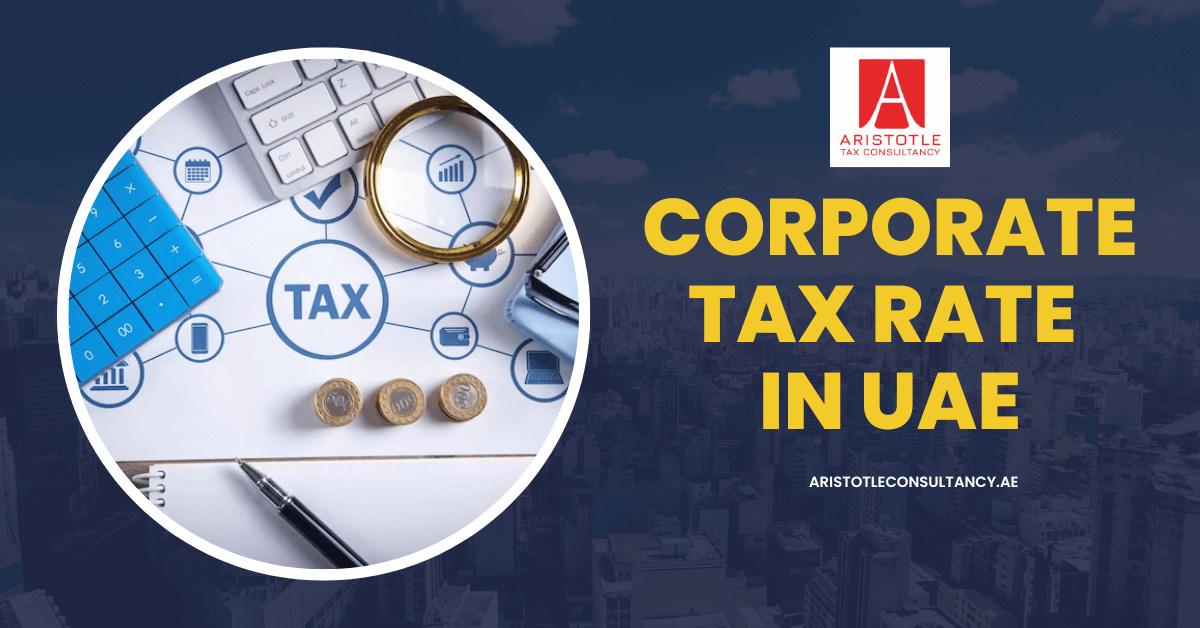Corporate Tax Rate in UAE
Introduction – Corporate Tax Rate in UAE
In the UAE, a federal tax on corporations and company earnings (referred to as “Corporate Tax”) is imposed by the Corporate Tax Law. It consists of 20 Chapters and 70 Articles that address a variety of topics, including the corporate tax regime’s administration, compliance regulations, and application.
The net income or profit of corporations and other organizations from their operations is subject to corporate tax (CT), a type of direct tax. It can also be referred to as Corporate Income / Profit Tax.
1. Taxable Person and Corporate Tax Base
• Taxable Person: The Corporate Tax shall be levied on taxable person and a taxable person shall be either a Resident Person or a Non-Resident Person.
• Corporate Tax Base:
a) Businesses and other legal entities incorporated in the UAE or that are effectively managed and controlled there.
b) Non-resident legal entities with a permanent establishment in the United Arab Emirates.
c) Individuals carrying any trade or business activity in the United Arab Emirates. However revenue derived from wages, personal investment income, and real estate investment income does not fall under Trade or business activity and thus excluded from ambit of corporate tax.
d) Businesses or business activities carried on by a resident or non-resident natural person are subject to corporation tax only if the total turnover derived from such businesses or business activities exceeds AED 1,000,000 (one million United Arab Emirates dirhams) within a Gregorian calendar year.
2. Effective Date of Corporate Income Tax
For fiscal years beginning on or after 1 June 2023, corporation tax will be imposed.
Any business that adopts a fiscal year that starts on June 1 and ends on May 31, 2024, will be subject to CT as of that date. Early in 2024, the first tax return filing is anticipated to be required.
Any corporation that adopts a calendar year that begins on January 1 and ends on December 31 of that year will be subject to CT beginning on January 1 of the following year, and the file is anticipated to be due in the middle of 2025.
3. Corporate Tax Rate in UAE for Businesses
The rate of Corporate Tax is as follows:
- 0% on Taxable Income up to and including AED 375,000; and
- 9% on Taxable Income above AED 375,000.
4. Corporate Tax Rate in UAE for Natural Persons
- The business or business activities conducted by a resident or non-resident natural person shall be covered under Corporate Tax where the total turnover generated from such businesses or business activities exceeds AED 1,000,000 (One million United Arab Emirates Dirhams) within a Gregorian calendar year.
- Income generated by Resident or non-resident natural person from following sources shall not be subject to Corporate Tax:
a. Wage
b. Personal Investment Income
c. Real Estate Investment Income
5. Relief for small businesses
Article 21 mention the benefit given to start-ups and other small or microbusinesses by lowering their corporate tax and compliance.
A resident taxable person can opt for small business relief, which results in them being treated as if they do not receive any taxable income under the following conditions according to Ministerial Decision No. 73 of 2023:
- The applicable tax period’s and the prior tax periods’ revenues do not exceed AED 3,000,000.
- The threshold limit above applies to tax periods beginning on or after 1 June 2023 and will continue to apply only until 31 December 2026
- A permanent resident electing small business relief should not be a qualified person in a free zone.
- Resident taxable person electing Small Business Aid should not be a founding company of a multinational group of companies as defined in Cabinet Decision 44.
6. Exception from Registration for Corporate Tax
The following categories of persons are exempt from corporate income tax.
a) Government entities of the UAE
b) Entities controlled by the UAE government.
c) People working in the UAE’s mining industry.
d) Persons engaged in non-extractive natural resource business in the United Arab Emirates
e) Authorized public benefit entities.
f) Qualified investment funds
g) Pension funds or social security funds
h) A state-incorporated business that is entirely owned and managed by exempt individuals.
i) Any other individual that the Government may decide to name in response to the Minister’s suggestion.
Navigating Tax Planning
While Dubai’s tax framework is favorable, proper tax planning is crucial. This is where Aristotle Tax Consultancy steps in as your reliable corporate tax consultant in Dubai. We offer expert guidance to optimize your tax strategy, ensuring compliance while maximizing tax efficiencies. With a deep understanding of local regulations and global tax trends, we tailor solutions that align with your business goals.
Leveraging Our Expertise:
At Aristotle Tax Consultancy, we go beyond the surface to provide comprehensive insights into corporate tax matters. Our seasoned team of corporate tax consultants in Dubai is dedicated to helping you optimize your tax strategy while ensuring full compliance with local regulations.
Tailored Solutions: We understand that each business is unique. Our corporate tax consultants craft personalized strategies that align with your specific industry, goals, and financial situation.
Strategic Planning: Navigating the corporate tax landscape requires strategic planning. Our consultants analyze your business structure and operations to identify opportunities for tax optimization while minimizing risks.
Compliance and Reporting: Staying compliant with tax regulations is non-negotiable. Our experts keep you up-to-date with the latest changes, handle all reporting requirements, and ensure your business remains on the right side of the law.


